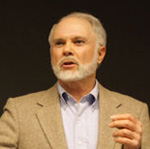RS: It's called "I Love It When You Talk Retro: Hoochie Coochie, Double Whammy, Drop a Dime, and the Forgotten Origins of American Speech."
AA: "'Double whammy' and 'drop a dime.' Let's start with double whammy. What does that mean exactly?"
 |
"Now, when Evil Eye Fleegle decided to put both of his eyes on a person or object and point two fingers, this could stop a rushing locomotive or topple a skyscraper. And this was a double whammy. And the only person who could withstand not just a single whammy but a double whammy was Mammy Yokum, Li'l Abner Yokum's wizened old mother who smoked a corncob pipe. And she would whirl and spin and totter around, but she was still standing when Evil Eye Fleegle tried to lay her low with a double whammy."
RS: "So a double whammy today would mean?"
RALPH KEYES: "Anything where two things lay you low. Let's say somebody decides to run for office and it turns out they have a residency problem and they're not old enough. That's a double whammy.
RS: "Or you could have the flu and other medical complications -- "
RALPH KEYES: "Sure."
RS: "at the same time. So you would be hit by a double whammy. What was the second ... "
AA: "It was drop a dime."
RS: "Uh-huh."
RALPH KEYES: "Drop a dime. Now this one is really problematic for kids who have grown up with cell phones because they don't recall, as you and I may, the glorious golden era of telephone booths. Making a call from a public telephone in a phone booth usually cost a dime. And so when we wanted to squeal on someone, to be a whistleblower and call the cops from a phone that couldn't be traced or where people couldn't see us, we would go into a phone booth, put a dime in and call the police. This is called dropping a dime."
RS: "Is it something that is still in use today?"
RALPH KEYES: "Well, the phrase is. We still talk about dropping a dime, to say that we're reporting someone, and then we become a dime dropper. But gosh, how many public phones are there out there anymore?"
RS: "Not many."
AA: "And they certainly cost more than a dime now. I think they're like fifty cents."
RALPH KEYES: "That's for sure."
AA: "You use the term in here, you talk about some all-American terms and one of them is 'Ozzie and Harriet.'"
RALPH KEYES: "Yeah."
AA: "Why don't you explain to people who maybe aren't familiar with old American television."
RALPH KEYES: "Well, this is a show from the fifties where Ozzie Nelson and Harriet Nelson ran what was considered to be the ideal American family in 'The Adventures of Ozzie and Harriet.'"
AA: "And they were real people, weren't they?"
RALPH KEYES: "Yeah, they were actually married to each other."
AA: "Right. And then they were also actors. But it wasn't like what we would today call -- "
RS: "And their kids were part of the ... they were a real American family."
(MUSIC)
TV ANNOUNCER: "And now, Hotpoint presents America's favorite family comedy, 'The Adventures of Ozzie and Harriet' starring the entire Nelson family."
OZZIE: "Where's Rick?"
DAVID: "Well, he was with me a minute ago."
OZZIE: "Ricky?
RICKY NELSON: "I'm coming."
OZZIE: "Come on, breakfast is just about ready."
AA: "Today we'd say it would be like a reality show, but it wasn't a reality show."
RS: "No, it was all scripted."
AA: "It was scripted."
RALPH KEYES: "And in fact it was a fantasy show because people thought 'Oh, Ozzie and Harriet, that's the way a family ought to be.' And they still talk about that. You know, an 'Ozzie and Harriet' type of family where everything goes smoothly and the dad wears a cardigan sweater and the mom has an apron on and she's always bustling through the kitchen door with a nice plate of warm brownies."
AA: Stay tuned next week for more of our conversation with Ralph Keyes, author of the new book "I Love It When You Talk Retro."
RS: And that's WORDMASTER for this week. To learn more about American English, go to voanews.com/wordmaster. With Avi Arditti, I'm Rosanne Skirble.